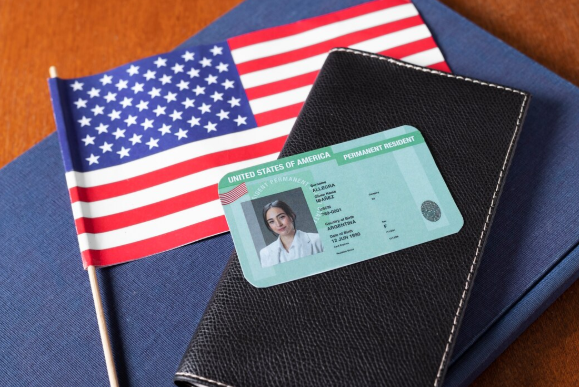EB-1A Green Card: What Happens After You Get It?
When your EB-1A approval finally comes through, whether it’s a USCIS notification or the green card itself in the mail, there’s this moment of silence. After months of building a case around your life’s work, that one piece of mail suddenly makes it real: You’ve made it.
At Passage Immigration Law, we’ve seen that moment up close. For researchers, artists, entrepreneurs, and academics alike, the journey to the EB-1A green card is always personal. It takes ambition, vulnerability, and precision. But what most people don’t expect is the uncertainty that follows.
You’ve reached the top. Now what?
This blog is for the people who’ve made it, who’ve proven they have extraordinary ability and are wondering what this next chapter looks like. We’ll walk you through what happens after approval, what your rights are, and how to avoid common mistakes that could harm everything you’ve worked so hard for.
You’ve Got the Green Card. What Exactly Have You Earned?
The EB1A green card isn’t just permanent residency, it’s independence. You didn’t need an employer to petition for you. You didn’t wait years in a backlogged category. You qualified because you proved you’re one of the best in your field.
That means you’re not tied to a company or job. You can freelance. You can launch a startup. You can take a while. It’s your future, your name on the petition got you here, and it’s your talent that will carry you forward.
This kind of freedom is what makes the green card EB1A route so powerful. But it’s also why post-approval planning is crucial.
Understanding Your Rights and Responsibilities
Once you have your card in hand, you now hold the rights of a lawful permanent resident. That includes:
- Living and working anywhere in the U.S.
- Traveling internationally
- Applying for U.S. citizenship after five years
- Sponsoring your spouse and children under 21
But rights come with responsibilities. You must keep your extraordinary ability green card valid, maintain ties to the U.S., and file your taxes here. Even a green card can be lost if you appear to abandon your residency.
We’ve had clients nearly lose their status after staying abroad too long, not because they didn’t care, but because no one warned them how strict USCIS can be.
The Tax Rule That Surprises Most EB-1A Recipients

One of the biggest surprises for newly approved clients is that they’re now considered U.S. tax residents. No matter where your income comes from, a grant in Canada, a business deal in India, royalties from Europe, you must report it on your U.S. return.
If you received your green card through the EB1 green card process, even before citizenship, you’re bound to U.S. tax law. This includes disclosing foreign bank accounts, investments, and assets.
Many EB-1A clients work across borders. We always advise partnering with an international tax specialist early, before tax season sneaks up on you.
Can You Travel Freely Now? Yes, With Limits
You can finally leave the country without constantly checking visa stamp dates, but don’t get too comfortable.
If you’re outside the U.S. for more than 6 months, immigration may question whether you’ve abandoned your residence. Over 1 year, and you’ll need a reentry permit or risk losing your green card entirely.
We’ve guided many EB-1A recipients through long research trips, performances abroad, or family emergencies. With smart planning, travel is fine. But it’s not unlimited, and USCIS can revoke status if they believe you’re not living here full-time.
That’s why we remind every client with an EB-1a green card: this is your home now. Keep ties that show that’s true.
Family Sponsorship: What You Can Do Now
One of the best parts of becoming a green card holder is the ability to sponsor your spouse and unmarried children under 21. Even if they’re not in the U.S. yet, you can file petitions for them immediately.
This is a life-changing benefit, especially for clients who went through the EB-1A process alone. We’ve had clients from South Africa, Brazil, and the Philippines who received their green card, then brought their entire family over within a year.
If your EB-1A visa just got approved, now’s the time to start the family paperwork. There’s no need to wait for citizenship to protect the people closest to you.
Can You Change Careers or Step Away From Work?

We get this question a lot: Now that I have my green card, can I try something new?
The answer is yes, and that’s part of what makes the EB1A category requirements so unique. Because you self-petitioned based on your field, you’re not obligated to work for anyone else. You can switch roles, take a break, or shift directions.
That said, if you plan to apply for citizenship down the road, USCIS may ask whether you’ve continued to contribute to your field. It doesn’t mean you need to win awards, just stay active, visible, and relevant.
We encourage every client to keep a “success file”, conferences attended, publications, press coverage, client projects, even after getting their extraordinary ability visa.
Looking Ahead: Planning for Citizenship
Your EB-1A green card puts you on a five-year path to U.S. citizenship or three years if you marry a U.S. citizen. But don’t let the calendar run without intention.
Here’s what you’ll need to qualify:
- Five years of physical presence (or 3 with a U.S. citizen spouse)
- At least 30 months spent inside the U.S.
- No long international absences (over 6 months)
- Continued “good moral character,” including clean taxes and no criminal history
The EB1a green card processing time is short compared to many other paths. But citizenship? That still requires you to stay the course.
Final Thoughts: This Is the Life You Worked For, Now Protect It

After all the work it took to meet the EB1A criteria, the last thing you want is to lose what you earned by accident. Don’t forget that this is your moment, not just to stay in the country, but to thrive here.
At Passage Immigration Law, we’ve helped hundreds of clients not only win their EB-1A petitions, but build smart, secure lives after approval. From sponsoring family to filing taxes correctly to staying compliant for citizenship, we stay with you, long after your green card arrives.
Disclaimer: This article offers general legal information, not legal advice. Do not rely upon this information without seeking legal counsel. If you need legal advice, you may contact us directly to speak with an attorney. We disclaim all liability concerning actions taken based on any information presented. Every case is different, and outcomes will vary depending on the unique facts and legal issues of your case.







